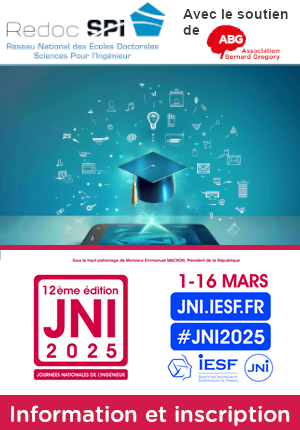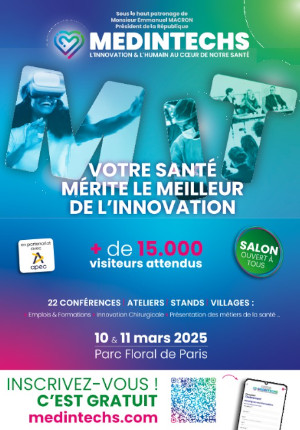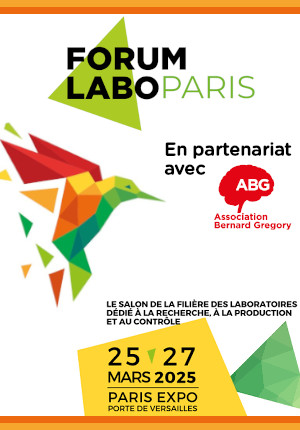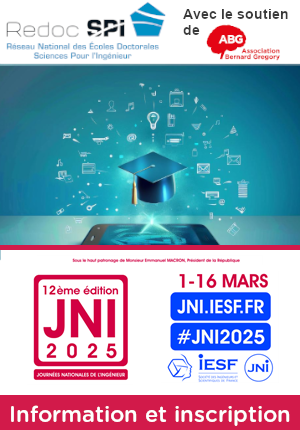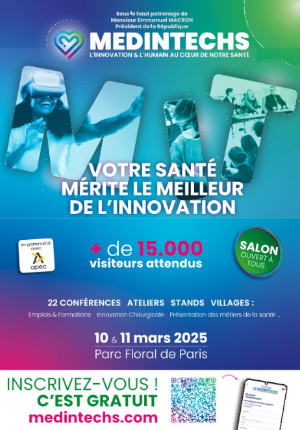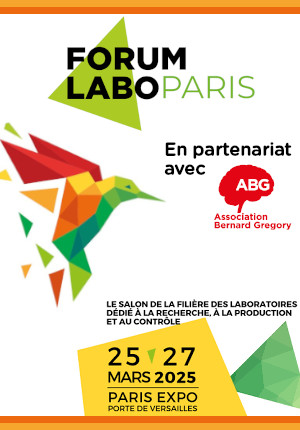Identification en temps-réel de systèmes linéaires à paramètres variants pour applications aux transferts thermiques dans les poumons lors des opérations de chirurgie cardiaque // Real-time Systeme identification of linear parameter varying systems for ap
|
ABG-128624
ADUM-61306 |
Sujet de Thèse | |
| 14/02/2025 |
Université de Bordeaux
Talence - France
Identification en temps-réel de systèmes linéaires à paramètres variants pour applications aux transferts thermiques dans les poumons lors des opérations de chirurgie cardiaque // Real-time Systeme identification of linear parameter varying systems for ap
- Informatique
Identification, Systèmes à paramètres variants, temps-réel, calcul fractionnaire, système fractionnaire, transfert thermique
System Identification , Parameter varying system, Real-time, fractional calculus, Fractional system, heat transfers
System Identification , Parameter varying system, Real-time, fractional calculus, Fractional system, heat transfers
Description du sujet
Le contexte de la thèse est la chirurgie cardiaque. La connaissance du comportement thermique des poumons est cruciale pour les anesthésiologistes et chirurgiens-cardiologues. En effet, lors des opérations de chirurgie cardiaque, la mise en place d'une circulation extracorporelle est nécessaire par une machine cœur-poumon artificiel. Cependant, les poumons se retrouvent exclus de la circulation sanguine et sont privés de sang et d'oxygène pendant toute la durée de l'opération, ce qui entraîne des dommages inévitables pour les tissus de ces organes. Une hypothermie permet de ralentir le métabolisme des cellules pulmonaires et donc de ralentir la progression des dommages.
Les poumons présentent une géométrie fractale au travers des subdivisions des bronches. Or la dérivation non entière étant étroitement liée aux géométries fractales et récursives [1][2][3][4], celle-ci est parfaitement justifiée pour modéliser cet organe à la fois en pneumatique [3][4] qu'en thermique [9][10][11].
Des travaux pluridisciplinaires ont été réalisés en collaboration avec le service Anesthésiologie-Réanimation II de l'Hôpital du Haut-Lévêque du CHU de Bordeaux, et plus particulièrement avec le Pr F. Roubertie [5][6][7][8][17]. Cette Thèse s'inscrit dans la poursuite des résultats d'une première Thèse [17]. Le perfectionnement de l'hypothermie bronchique requiert des modèles mathématiques à peu de paramètres, facilement exploitables et capables de rendre compte des variations thermiques à l'intérieur du poumon durant les opérations chirurgicales. A partir des premières mesures sur des moutons, des modèles non entiers ont été identifiés en considérant deux états différents du système thermique avec ou sans circulation extracorporelle mais également en réalisant une identification des paramètres en hors-ligne.
Ce projet est innovant en ce sens que les variations paramétriques physiologiques tenant compte de l'état fonctionnel des poumons seront identifiés en temps-réel et permettront de constater l'influence de l'hypothermie et notamment la dégradation des poumons pendant l'intervention chirurgicale avec et sans CEC.
------------------------------------------------------------------------------------------------------------------------------------------------------------------------
------------------------------------------------------------------------------------------------------------------------------------------------------------------------
The context of the research project concerns cardiac surgery. A knowledge of the thermal behavior of lungs is crucial for anesthesiologists and cardiac surgeons. Indeed, during cardiac surgery, the setup of extracorporeal circulation (ECC) is required with an artificial heart-lung device. However, the lungs can become excluded from blood flow and are then deprived from blood and oxygen during the whole surgery, after which inevitable damages can occur on the organ tissues. Hypothermia can enable slowing down the metabolism of pulmonary cells and therefore enabling reducing the damage progression.
The lungs present a fractal geometry through its arborescent branch subdivisions. However, fractional derivative being closely linked with fractal and recursive geometry [1][2][3][4], such an operator is well justified to model the lungs both in pneumatics [3][4] than in heat science [9][10][11].
Some interdisciplinary research works have been carried out in collaboration with the anesthesiology-intensive care unit of the Haut-Lévêque Bordeaux hospital, and more particularly with Pr F. Roubertie [5][6][7][8][17]. This research project is inscribed in the pursuance of the theoretical first work [17]. The improvement of bronchial hypothermia requires numerical models with varying parameters, easily exploitable and able to render the thermal variations inside the lungs and during surgery. From first measurements experiments on sheep lungs and in offline, fractional models that have been identified by considering two different states of the thermal system with and without extracorporeal circulation.
This project is innovative in the sense that the physiological parametric variations taking into account the real functional state of the lungs will be identified in real-time and will enable to certify the hypothermia influence and notably the degradation of the lungs during cardiac surgery with and without ECC.
------------------------------------------------------------------------------------------------------------------------------------------------------------------------
------------------------------------------------------------------------------------------------------------------------------------------------------------------------
Début de la thèse : 01/10/2025
Les poumons présentent une géométrie fractale au travers des subdivisions des bronches. Or la dérivation non entière étant étroitement liée aux géométries fractales et récursives [1][2][3][4], celle-ci est parfaitement justifiée pour modéliser cet organe à la fois en pneumatique [3][4] qu'en thermique [9][10][11].
Des travaux pluridisciplinaires ont été réalisés en collaboration avec le service Anesthésiologie-Réanimation II de l'Hôpital du Haut-Lévêque du CHU de Bordeaux, et plus particulièrement avec le Pr F. Roubertie [5][6][7][8][17]. Cette Thèse s'inscrit dans la poursuite des résultats d'une première Thèse [17]. Le perfectionnement de l'hypothermie bronchique requiert des modèles mathématiques à peu de paramètres, facilement exploitables et capables de rendre compte des variations thermiques à l'intérieur du poumon durant les opérations chirurgicales. A partir des premières mesures sur des moutons, des modèles non entiers ont été identifiés en considérant deux états différents du système thermique avec ou sans circulation extracorporelle mais également en réalisant une identification des paramètres en hors-ligne.
Ce projet est innovant en ce sens que les variations paramétriques physiologiques tenant compte de l'état fonctionnel des poumons seront identifiés en temps-réel et permettront de constater l'influence de l'hypothermie et notamment la dégradation des poumons pendant l'intervention chirurgicale avec et sans CEC.
------------------------------------------------------------------------------------------------------------------------------------------------------------------------
------------------------------------------------------------------------------------------------------------------------------------------------------------------------
The context of the research project concerns cardiac surgery. A knowledge of the thermal behavior of lungs is crucial for anesthesiologists and cardiac surgeons. Indeed, during cardiac surgery, the setup of extracorporeal circulation (ECC) is required with an artificial heart-lung device. However, the lungs can become excluded from blood flow and are then deprived from blood and oxygen during the whole surgery, after which inevitable damages can occur on the organ tissues. Hypothermia can enable slowing down the metabolism of pulmonary cells and therefore enabling reducing the damage progression.
The lungs present a fractal geometry through its arborescent branch subdivisions. However, fractional derivative being closely linked with fractal and recursive geometry [1][2][3][4], such an operator is well justified to model the lungs both in pneumatics [3][4] than in heat science [9][10][11].
Some interdisciplinary research works have been carried out in collaboration with the anesthesiology-intensive care unit of the Haut-Lévêque Bordeaux hospital, and more particularly with Pr F. Roubertie [5][6][7][8][17]. This research project is inscribed in the pursuance of the theoretical first work [17]. The improvement of bronchial hypothermia requires numerical models with varying parameters, easily exploitable and able to render the thermal variations inside the lungs and during surgery. From first measurements experiments on sheep lungs and in offline, fractional models that have been identified by considering two different states of the thermal system with and without extracorporeal circulation.
This project is innovative in the sense that the physiological parametric variations taking into account the real functional state of the lungs will be identified in real-time and will enable to certify the hypothermia influence and notably the degradation of the lungs during cardiac surgery with and without ECC.
------------------------------------------------------------------------------------------------------------------------------------------------------------------------
------------------------------------------------------------------------------------------------------------------------------------------------------------------------
Début de la thèse : 01/10/2025
Nature du financement
Précisions sur le financement
Appel à projets - UB PhD Scholarships
Présentation établissement et labo d'accueil
Université de Bordeaux
Etablissement délivrant le doctorat
Université de Bordeaux
Ecole doctorale
209 Sciences Physiques et de l'Ingénieur
Profil du candidat
The candidate should have followed an initial training course of type Research Master 2 or Engineering School in Automatic Control (typically the specialization AM2AS (Automatic control and Mechatronics, Automotive, Aeronautics & Space) from the Master Complex System Engineering from Université de Bordeaux) with an interest in Life Sciences. Consequently, he should master theoretical concepts in thermal system modeling, system identification and fractional calculus. This last skill gathers many assets in modeling diffusive phenomenon and more specifically in our study case: in the heat transfer modeling of thermal impedance in lungs.
He should master theoretical concepts in signal processing and also practical skills in data acquisition and experiment design.
It would be appreciated that the candidate has carried out a research internship or research project on fractional systems or more specifically has used modeling tools such as the toolbox CRONE developed under Matlab®.
Skills on data acquisition such as Labview or Dspace with communication under Matlab would be assets in data acquisition.
The candidate's open-mindedness and relationship should help him work with the research team and automatic control Group, and consequently with the other PhD students.
Skills to be acquired by the Doctorate candidate
• Python: Basics to data manipulation
• Inversion et imagerie haute résolution (data processing, data filtering, 2D/3D imaging, …)
• Propriété intellectuelle (brevet) et protection du patrimoine scientifique
• MOOC Research integrity in scientific professions
• Modélisation et identification en temps réel des systèmes non entiers – Cours/Conférences proposée en Master 2 AM2AS (https://formations.u-bordeaux.fr/#/details-formation?type=enseignement&id=20418 )
• MOOC Éthique de la recherche
• MOOC Research integrity in scientific professions
• Valoriser ma thèse et mes publications scientifiques avec l'accès ouvert - Session 1
• Inversion et imagerie haute résolution
• Protection des données à caractère personnel et recherche scientifique
• Spring School in identification
Sont éligibles uniquement des candidatures internationales, à savoir :
- des candidates ou candidats ayant obtenu (ou en cours d'obtention de) leur diplôme d'accès au doctorat (Master ou équivalent) dans un établissement à l'étranger
- des candidates ou candidats actuellement dans un Graduate Program de l'université de Bordeaux, inscrits en deuxième année de Master et ayant obtenu leur diplôme d'accès au Master dans un établissement à l'étranger
Seront prises en compte uniquement les candidatures soumises sur la plateforme suivante : https://aap.u-bordeaux.fr/ et avant le 17 mars à 23h59 (GMT Paris).
Un guide de candidature ainsi que la liste des documents à soumettre sont disponibles sur la plateforme.
Pour toute question, veuillez contacter : internationalisation.doctorat@u-bordeaux.fr
The candidate should have followed an initial training course of type Research Master 2 or Engineering School in Automatic Control (typically the specialization AM2AS (Automatic control and Mechatronics, Automotive, Aeronautics & Space) from the Master Complex System Engineering from Université de Bordeaux) with an interest in Life Sciences. Consequently, he should master theoretical concepts in thermal system modeling, system identification and fractional calculus. This last skill gathers many assets in modeling diffusive phenomenon and more specifically in our study case: in the heat transfer modeling of thermal impedance in lungs. He should master theoretical concepts in signal processing and also practical skills in data acquisition and experiment design. It would be appreciated that the candidate has carried out a research internship or research project on fractional systems or more specifically has used modeling tools such as the toolbox CRONE developed under Matlab®. Skills on data acquisition such as Labview or Dspace with communication under Matlab would be assets in data acquisition. The candidate's open-mindedness and relationship should help him work with the research team and automatic control Group, and consequently with the other PhD students. Skills to be acquired by the Doctorate candidate • Python: Basics to data manipulation • Inversion et imagerie haute résolution (data processing, data filtering, 2D/3D imaging, …) • Propriété intellectuelle (brevet) et protection du patrimoine scientifique • MOOC Research integrity in scientific professions • Modélisation et identification en temps réel des systèmes non entiers – Cours/Conférences proposée en Master 2 AM2AS (https://formations.u-bordeaux.fr/#/details-formation?type=enseignement&id=20418 ) • MOOC Éthique de la recherche • MOOC Research integrity in scientific professions • Valoriser ma thèse et mes publications scientifiques avec l'accès ouvert - Session 1 • Inversion et imagerie haute résolution • Protection des données à caractère personnel et recherche scientifique • Spring School in identification The UB PhD scholarship program is open to international candidates only, which means: - candidates holding (or currently enrolled in) a national level master's degree or another degree conferring master's status from a foreign institution - candidates currently in a Graduate Program, enrolled in second year of Master at the University of Bordeaux, and holding a degree from a foreign institution We will only consider applications submitted on the following platform: https://aap.u-bordeaux.fr/ and prior March 17, at 11:59pm (GMT Paris). A guide on how to apply as well as the list of documents to submit are available on the platform. For any question, please contact: internationalisation.doctorat@u-bordeaux.fr
The candidate should have followed an initial training course of type Research Master 2 or Engineering School in Automatic Control (typically the specialization AM2AS (Automatic control and Mechatronics, Automotive, Aeronautics & Space) from the Master Complex System Engineering from Université de Bordeaux) with an interest in Life Sciences. Consequently, he should master theoretical concepts in thermal system modeling, system identification and fractional calculus. This last skill gathers many assets in modeling diffusive phenomenon and more specifically in our study case: in the heat transfer modeling of thermal impedance in lungs. He should master theoretical concepts in signal processing and also practical skills in data acquisition and experiment design. It would be appreciated that the candidate has carried out a research internship or research project on fractional systems or more specifically has used modeling tools such as the toolbox CRONE developed under Matlab®. Skills on data acquisition such as Labview or Dspace with communication under Matlab would be assets in data acquisition. The candidate's open-mindedness and relationship should help him work with the research team and automatic control Group, and consequently with the other PhD students. Skills to be acquired by the Doctorate candidate • Python: Basics to data manipulation • Inversion et imagerie haute résolution (data processing, data filtering, 2D/3D imaging, …) • Propriété intellectuelle (brevet) et protection du patrimoine scientifique • MOOC Research integrity in scientific professions • Modélisation et identification en temps réel des systèmes non entiers – Cours/Conférences proposée en Master 2 AM2AS (https://formations.u-bordeaux.fr/#/details-formation?type=enseignement&id=20418 ) • MOOC Éthique de la recherche • MOOC Research integrity in scientific professions • Valoriser ma thèse et mes publications scientifiques avec l'accès ouvert - Session 1 • Inversion et imagerie haute résolution • Protection des données à caractère personnel et recherche scientifique • Spring School in identification The UB PhD scholarship program is open to international candidates only, which means: - candidates holding (or currently enrolled in) a national level master's degree or another degree conferring master's status from a foreign institution - candidates currently in a Graduate Program, enrolled in second year of Master at the University of Bordeaux, and holding a degree from a foreign institution We will only consider applications submitted on the following platform: https://aap.u-bordeaux.fr/ and prior March 17, at 11:59pm (GMT Paris). A guide on how to apply as well as the list of documents to submit are available on the platform. For any question, please contact: internationalisation.doctorat@u-bordeaux.fr
17/03/2025
Postuler
Fermer
Vous avez déjà un compte ?
Nouvel utilisateur ?
Besoin d'informations sur l'ABG ?
Vous souhaitez recevoir nos infolettres ?
Découvrez nos adhérents
 ADEME
ADEME  CASDEN
CASDEN  CESI
CESI  Nokia Bell Labs France
Nokia Bell Labs France  ONERA - The French Aerospace Lab
ONERA - The French Aerospace Lab  PhDOOC
PhDOOC  Aérocentre, Pôle d'excellence régional
Aérocentre, Pôle d'excellence régional  Groupe AFNOR - Association française de normalisation
Groupe AFNOR - Association française de normalisation  Tecknowmetrix
Tecknowmetrix  ANRT
ANRT  Laboratoire National de Métrologie et d'Essais - LNE
Laboratoire National de Métrologie et d'Essais - LNE  MabDesign
MabDesign  TotalEnergies
TotalEnergies  MabDesign
MabDesign  Ifremer
Ifremer  Institut de Radioprotection et de Sureté Nucléaire - IRSN - Siège
Institut de Radioprotection et de Sureté Nucléaire - IRSN - Siège  Généthon
Généthon  SUEZ
SUEZ  Institut Sup'biotech de Paris
Institut Sup'biotech de Paris



